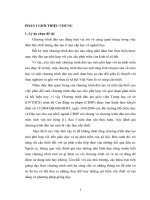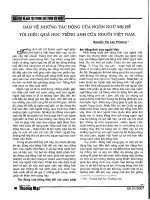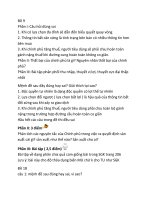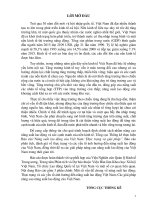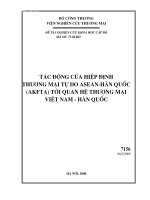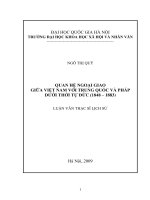Tác động của hiệp định thương mại tự do ASEAN úc new zealand đến quan hệ thương mại của việt nam với úc và new zealand TT tiếng anh
Bạn đang xem bản rút gọn của tài liệu. Xem và tải ngay bản đầy đủ của tài liệu tại đây (441.95 KB, 26 trang )
VIETNAM ACADEMY OF SOCIAL SCIENCES
GRADUATE ACADEMY OF SOCIAL SCIENCES
NGUYEN HA PHUONG
THESIS
IMPACT OF ASEAN-AUSTRALIA- NEW ZEALAND
FREE TRADE AGREEMENT ON TRADE RELATIONS
BETWEEN VIETNAM AND AUSTRALIA, NEWZEALAND
Major: International Economics
Major code: 9 31 01 06
SUMMARY OF THE THESIS
Hanoi, 2019
The thesis is completed in: Graduate Academy of Social Sciences,
Vietnam Academy of Social Sciences.
Supervisors:
1. Assoc.Prof.Dr. Nguyen Chien Thang
2. Assoc.Prof.Dr. Dang Thi Phuong Hoa
Reviewer 1: Prof. Dr. Do Duc Binh
Reviewer 2: Assoc.Prof.Dr. Trinh Thi Thanh Thuy
Reviewer 3: Assoc.Prof.Dr. Trinh Thi Hoa Mai
Phd thesis will be defended in front of the Academy-level
Dissertation Committee in: ........................................................
..................................................................................................
at………..….…………, ……………….………………..
The thesis can be found at the library:
INTRODUCTION
1. The rationale
Vietnam has established formal diplomatic relations with Australia
since 1973 and with New Zealand since 1975. Over the past 40 years, the
relationship between Vietnam and Australia and New Zealand has been
continuously consolidated and developed, especially in the economic field.
In recent years, the Government of Vietnam, Australia and New Zealand
have always launched many policies to promote the expansion and
development of economic and trade relations among countries, facilitating
businesses in the export dynamics, especially Vietnam's exports to these
two important markets. Currently, Australia and New Zealand are one of
Vietnam's major trading partners.
On February 27th, 2009, after 34 years with many rounds of
discussions and negotiations, the ASEAN-Australia-New Zealand Free
Trade Agreement (AANZFTA) was signed at the 14th ASEAN Summit in
Thailand. The following year, AANZFTA entered into force. Accordingly,
AANZFTA is the first trade agreement between Australia and New
Zealand with trade partners from ASEAN including Vietnam. AANZFTA
not only brings many opportunities but also challenges to economic
relations in general, trade in goods in particular between Vietnam and
Australia, New Zealand. If Vietnam can take advantage of this
opportunity, it will be an extremely favorable condition for Vietnam to
easily expand its market, absorb advanced technology and improve the
quantity and quality of export products with Australia and New Zealand.
However, compared to some ASEAN countries, trade between Vietnam
and these two countries is still modest. Specifically, in 2017, Vietnam
ranked fifth in total import-export turnover with Australia and New
Zealand, after Thailand, Malaysia, Singapore and Indonesia with a
relatively far distance. Thus, increasing export of goods through reducing
trade barriers for Vietnamese exports to Australia and New Zealand is an
urgent need now and in the future.
AANZFTA has been signed and implemented for nearly 10 years, of
which Vietnam is an official member. The implementation process of the
Agreement has changed the trade in goods between Vietnam and Australia
and New Zealand. Therefore, in-depth study of the impacts of AANZFTA
on trade relations, namely import and export of goods between Vietnam
with these two countries, is extremely necessary in making comments and
assessments in time to make appropriate strategic adjustments, taking
advantage of AANZFTA's commitments in promoting trade and improving
relations with these two potential partners.
Moreover, Vietnam, Australia and New Zealand are also members of the
Regional Comprehensive Economic Partnership (RCEP) and the
Comprehensive and Progressive Agreement for Trans-Pacific Partnership
3
(CPTPP). The problem is compounded by the fact that Vietnam and its
partners have to implement different free trade agreements (FTAs).
Therefore, the study of the implementation impacts of AANZFTA plays an
important role in the process of developing policies and orienting
cooperation between Vietnam and Australia, New Zealand in the coming
time. Although there have been a number of studies and forecasts of the
impact of AANZFTA on Vietnam's economic development and trade
relations with participating partners, there must be adequate and
comprehensive studies in the new context. Therefore, the thesis " Impact of
ASEAN-Australia-New Zealand Free Trade Agreement on trade relations
between Vietnam and Australia, New Zealand" is extremely necessary in
the context of the dynamic integration today.
2.2. The purpose and research tasks of the thesis
2.1. Research purpose of the thesis
The thesis examines the actual impact of the ASEAN-Australia-New
Zealand Free Trade Agreement (AANZFTA) on Vietnam's trade in goods
with Australia and New Zealand after the agreement is signed. As a result,
asessment and suggestions for Vietnam are provided.
2.2. Research tasks of the thesis
• The thesis summarized the theoretical and practical contents that
are the basis of the ASEAN-Australia-New Zealand Free Trade Agreement
and its impact on Vietnam's trade in goods with Australia and New
Zealand.
• The thesis assessed the impact of AANZFTA on trade turnover,
growth rate and trade balance, the proportion of Vietnam's trade in goods
with Australia and New Zealand.
• The dissertation examined the shift in commodity structure in
Vietnam's trade with Australia and New Zealand before and after
AANZFTA is implemented.
• The thesis evaluated and analyzes the impact of AANZFTA's trade
creation and trade diversion on Vietnam's trade.
• The thesis analyzed the prospects and solutions for Vietnam to take
advantage of AANZFTA in trade in goods with Australia and New
Zealand.
3. Subjects and scope of research of the thesis
3.1. Research subjects
Research on the impact of implementing AANZFTA commitments
on trade in goods of Vietnam and Australia and New Zealand based on
three contents: impact on trade value of goods, impact on trade structure,
trade creation and trade diversion.
3.2. Research scope
-Content: the content of thesis is trade in goods relations,
particularly, the import and export of goods between Vietnam and
4
Australia, New Zealand, in which the commodity structure is classified
into two types: good groups under the HS code 2012 and good groups
according to the production stage.
-Time: The thesis will evaluate in the period 2002-2017 and
orientation 2025.
-Space: Countries in the AANZFTA (including Australia, New
Zealand, Vietnam, Brunei, Cambodia, Laos, Indonesia, Malaysia,
Myanmar, Philippines, Singapore and Thailand).
4. Methodology and research methods of the thesis
With the research object of exchanging trade in good between
Vietnam and Australia, New Zealand in the context of AANZFTA
implementation, the author used the Post- ante methods and give a rough
overview of trade potential. These methods are commonly used to assess
impacts after a free trade agreement is implemented.
4.1. Methodology and resources
The author approached the issue based on the theory of Free Trade
Agreement, the theory related to the impact of Free Trade Agreement on
trade in goods of nations. The qualitative and quantitative methods were
applied to examine the impact of AANZFTA on Vietnam's trade in goods
with Australia and New Zealand. In particular, the structure of goods is
classified into two types: groups under HS code 2012 and groups
according to production stage. References of the topic are collected from
import and export data from Trade map, Wits, Vietnam General
Department of Customs; GDP from the World Bank is the input to
calculate the impact of AANZFTA.
4.2. Research methods of the thesis
4.2.1. Qualitative method
Looking at the impact of AANZFTA on Vietnam's trade with
Australia and New Zealand, the author used the qualitative methods such
as general analysis methods, statistical methods and comparative methods
before and after AANZFTA was implemented, methods of inheritance,
experts’ opinions interviews. Since then, we can explain issues related to
the impact of AANZFTA on Vietnam's trade in goods with Australia and
New Zealand.
4.2.2. Quantitative methods
4.2.2.1. Method of using��������������������������������������������������������������������������������������������������������������������������������������������������������������������������������������������������������������������������������������������������������������������������������������������������������������������������������������������������������������������������������������������������������������������������������������������������������������������������������������������������������������������������������������������������������������������������������������������������������������������������������������������������������������������������������������������������������������������������������������������������������������������������������������������������������������������������������������������������������������������������������������������������������������������������������������������������������������������������������������������������������������������������������������������������������������������������������������������������������������������������������������������������������������������������������������������������������������������������������������������������������������������������������������������������������������������������������������������������������������������������������������������������������������������������������������������������������������������������������������������������������������������������������������������������������������������������������������������������������������������������������������������������������������������������������������������������������������������������������������������������������������������������������������������������������������������������������������������������������������������������������������������������������������������������������������������������������������������������������������������������������������������������������������������������������������������������������������������������������������������������������������������������������������������������������������������������������������������������������������������������������������������������������������������������������������������������������������������������������������������������������������������������������������������������������������������������������������������������������������������������������������������������������������������������������������������������������������������������������������������������������������������������������������������������������������������������������������������������������������������������������������������������������������������������������������������������������������������������������������������������������������������������������������������������������������������������������������������������������������������������������������������������������������������������������������������������������������������������������������������������������������������������������������������������������������������������������������������������������������������������������������������������������������������������������������������������������������������������������������������������������������������������������������������������������������������������������������������������������������������������������������������������������������������������������������������������������������������������������������������������������������������������������������������������������������������������������������������������������������������������������������������������������������������������������������������������������������������������������������������������������������������������������������������������������������������������������������������������������������������������������������������������������������������������������������������������������������������������������������������������������������������������������������������������������������������������������������������������������������������������������������������������������������������������������������������������������������������������������������������������������������������������������������������������������������������������������������������������������������������������������������������������������������������������������������������������������������������������������������������������������������������������������������������������������������������������������������������������������������������������������������������������������������������������������������������������������������������������������������������������������������������������������������������������������������������������������������������������������������������������������������������������������������������������������������������������������������������������������������������������������������������������������������������������������������������������������������������������������������������������������������������������������������������������������������������������������������������������������������������������������������������������������������������������������������������������������������������������������������������������������������������������������������������������������������������������������������������������������������������������������������������������������������������������������������������������������������������������������������������������������������������������������������������������������������������������������������������������������������������������������������������������������������������������������������������������������������������������������������������������������������������������������������������������������������������������������������������������������������������������������������������������������������������������������������������������������������������������������������������������������������������������������������������������������������������������������������������������������������������������������������������������������������������������������������������������������������������������������������������������������������������������������������������������������������������������������������������������������������������������������������������������������������������������������������������������������������������������������������������������������������������������������������������������������������������������������������������������������������������������������������������������������������������������������������������������������������������������������������������������������������������������������������������������������������������������������������������������������������������������������������������������������������������������������������������������������������������������������������������������������������������������������������������������������������������������������������������������������������������������������������������������������������������������������������������������������������������������������������������������������������������������������������������������������������������������������������������������������������������������������������������������������������������������������������������������������������������������������������������������������������������������������������������������������������������������������������������������������������������������������������������������������������������������������������������������������������������������������������������������������������������������������������������������������������������������������������������������������������������������������������������������������������������������������������������������������������������������������������������������������������������������������������������������������������������������������������������������������������������������������������������������������������������������������������������������������������������������������������������������������������������������������������������������������������������������������������������������������������������������������������������������������������������������������������������������������������������������������������������������������������������������������������������������������������������������������������������������������������������������������������������������������������������������������������������������������������������������������������������������������������������������������������������������������������������������������������������������������������������������������������������������������������������������������������������������������������������������������������������������������������������������������������������������������������������������������������������������������������������������������������������������������������������������������������������������������������������������������������������������������������������������������������������������������������������������������������������������������������������������������������������������������������������������������������������������������������������������������������������������������������������������������������������������������������������������������������������������������������������������������������������������������������������������������������������������������������������������������������������������������������������������������������������������������������������������������������������������������������������������������������������������������������������������������������������������������������������������������������������������������������������������������������������������������������������������������������������������������������������������������������������������������������������������������������������������������������������������������������������������������������������������������������������������������������������������������������������������������������������������������������������������������������������������������������������������������������������������������������������������������������������������������������������������������������������������������������������������������������������������������������������������������������������������������������������������������������������������������������������������������������������������������������������������������������������������������������������������������������������������������������������������������������������������������������������������������������������������������������������������������������������������������������������������������������������������������������������������������������������������������������������������������������������������������������������������������������������������������������������������������������������������������������������������������������������������������������������������������������������������������������������������������������������������������������������������������������������������������������������������������������������������������������������������������������������������������������������������������������������������������������������������������������������������������������������������������������������������������������������������������������������������������������������������������������������������������������������������������������������������������������������������������������������������������������������������������������������������������������������������������������������������������������������������������������������������������������������������������������������������������������������������������������������������������������������������������������������������������������������������������������������������������������������������������������������������������������������������������������������������������������������������������������������������������������������������������������������������������������������������������������������������������������������������������������������������������������������������������������������������������������������������������������������������������������������������������������������������������������������������������������������������������������������������������������������������������������������������������������������������������������������������������������������������������������������������������������������������������������������������������������������������������������������������������������������������������������������������������������������������������������������������������������������������������������������������������������������������������������������������������������������������������������������������������������������������������������������������������������������������������������������������������������������������������������������������������������������������������������������������������������������������������������������������������������������������������������������������������������������������������������������������������������������������������������������������������������������������������������������������������������������������������������������������������������������������������������������������������������������������������������������������������������������������������������������������������������������������������������������������������������������������������������������������������������������������������������������������������������������������������������������������������������������������������������������������������������������������������������������������������������������������������������������������������������������������������������������������������������������������������������������������������������������������������������������������������������������������������������������������������������������������������������������������������������������������������������������������������������������������������������������������������������������������������������������������������������������������������������������������������������������������������������������������������������������������������������������������������������������������������������������������������������������������������������������������������������������������������������������������������������������������������������������������������������������������������������������������������������������������������������������������������������������������������������������������������������������������������������������������������������������������������������������������������������������������������������������������������������������������������������������������������������������������������������������������������������������������������������������������������������������������������������������������������������������������������������������������������������������������������������������������������������������������������������������������������������������������������������������������������������������������������������������������������������������������������������������������������������������������������������������������������������������������������������������������������������������������������������������������������������������������������������������������������������������������������������������������������������������������������������������������������������������������������������������������������������������������������������������������������������������������������������������������������������������������������������������������������������������������������������������������������������������������������������������������������������������������������������������������������������������������������������������������������������������������������������������������������������������������������������������������������������������������������������������������������������������������������������������������������������������������������������������������������������������������������������������������������������������������������������������������������������������������������������������������������������������������������������������������������������������������������������������������������������������������������������������������������������������������������������������������������������������������������������������������������������������������������������������������������������������������������������������������������������������������������������������������������������������������������������������������������������������������������������������������������������������������������������������������������������������������������������������������������������������������������������������������������������������������������������������������������������������������������������������������������������������������������������������������������������������������������������������������������������������������������������������������������������������������������������������������������������������������������������������������������������������������������������������������������������������������������������������������������������������������������������������������������������������������������������������������������������������������������������������������������������������������������������������������������������������������������������������������������������������������������������������������������������������������������������������������������������������������������������������������������������������������������������������������������������������������������������������������������������������������������������������������������������������������������������������������������������������������������������������������������������������������������������������������������������������������������������������������������������������������������������������������������������������������������������������������������������������������������������������������������������������������������������������������������������������������������������������������������������������������������������������������������������������������������������������������������������������������������������������������������������������������������������������������������������������������������������������������������������������������������������������������������������������������������������������������������������������������������������������������������������������������������������������������������������������������������������������������������������������������������������������������������������������������������������������������������������������������������������������������������������������������������������������������������������������������������������������������������������������������������������������������������������������������������������������������������������������������������������������������������������������������������������������������������������������������������������������������������������������������������������������������������������������������������������������������������������������������������������������������������������������������������������������������������������������������������������������������������������������������������������������������������������������������������������������������������������������������������������������������������������������������������������������������������������������������������������������������������������������������������������������������������������������������������������������������������������������������������������������������������������������������������������������������������������������������������������������������������������������������������������������������������������������������������������������������������������������������������������������������������������������������������������������������������������������������������������������������������������������������������������������������������������������������������������������������������������������������������������������������������������������������������������������������������������������������������������������������������������������������������������������������������������������������������������������������������������������������������������������������������������������������������������������������������������������������������������������������������������������������������������������������������������������������������������������������������������������������������������������������������������������������������������������������������������������������������������������������������������������������������������������������������������������������������������������������������������������������������������������������������������������������������������������������������������������������������������������������������������������������������������������������������������������������������������������������������������������������������������������������������������������������������������������������������������������������������������������������������������������������������������������������������������������������������������������������������������������������������������������������������������������������������������������������������������������������������������������������������������������������������������������������������������������������������������������������������������������������������������������������������������������������������������������������������������������������������������������������������������������������������������������������������������������������������������������������������������������������������������������������������������������������������������������������������������������������������������������������������������������������������������������������������������������������������������������������������������������������������������������������������������������������������������������������������������������������������������������������������������������������������������������������������������������������������������������������������������������������������������������������������������������������������������������������������������������������������������������������������������������������������������������������������������������������������������������������������������������������������������������������������������������������������������������������������������������������������������������������������������������������������������������������������������������������������������������������������������������������������������������������������������������������������������������������������������������������������������������������������������������������������������������������������������������������������������������������������������������������������������������������������������������������������������������������������������������������������������������������������������������������������������������������������������������������������������������������������������������������������������������������������������������������������������������������������������������������������������������������������������������������������������������������������������������������������������������������������������������������������������������������������������������������������������������������������������������������������������������������������������������������������������������������������������������������������������������������������������������������������������������������������������������������������������������������������������������������������������������������������������������������������������������������������������������������������������������������������������������������������������������������������������������������������������������������������������������������������������������������������������������������������������������������������������������������������������������������������������������������������������������������������������������������������������������������������������������������������������������������������������������������������������������������������������������������������������������������������������������������������������������������������������������������������������������������������������������������������������������������������������������������������������������������������������������������������������������������������������������������������������������������������������������������������������������������������������������������������������������������������������������������������������������������������������������������������������������������������������������������������������������������������������������������������������������������������������������������������������������������������������������������������������������������������������������������������������������������������������������������������������������������������������������������������������������������������������������������������������������������������������������������������������������������������������������������������������������������������������������������������������������������������������������������������������������������������������������������������������������������������������������������������������������������������������������������������������������������������������������������������������������������������������������������������������������������������������������������������������������������������������������������������������������������������������������������������������������������������������������������������������������������������������������������������������������������������������������������������������������������������������������������������������������������������������������������������������������������������������������������������������������������������������������������������������������������������������������������������������������������������������������������������������������������������������������������������������������������������������������������������������������������������������������������������������������������������������������������������������������������������������������������������������������������������������������������������������������������������������������������������������������������������������������������������������������������������������������������������������������������������������������������������������������������������������������������������������������������������������������������������������������������������������������������������������������������������������������������������������������������������������������������������������������������������������������������������������������������������������������������������������������������������������������������������������������������������������������������������������������������������������������������������������������������������������������������������������������������������������������������������������������������������������������������������������������������������������������������������������������������������������������������������������������������������������������������������������������������������������������������������������������������������������������������������������������������������������������������������������������������������������������������������������������������������������������������������������������������������������������������������������������������������������������������������������������������������������������������������������������������������������������������������������������������������������������������������������������������������������������������������������������������������������������������������������������������������������������������������������������������������������������������������������������������������������������������������������������������������������������������������������������������������������������������������������������������������������������������������������������������������������������������������������������������������������������������������������������������������������������������������������������������������������������������������������������������������������������������������������������������������������������������������������������������������������������������������������������������������������������������������������������������������������������������������������������������������������������������������������������������������������������������������������������������������������������������������������������������������������������������������������������������������������������������������������������������������������������������������������������������������������������������������������������������������������������������������������������������������������������������������������������������������������������������������������������������������������������������������������������������������������������������������������������������������������������������������������������������������������������������������������������������������������������������������������������������������������������������������������������������������������������������������������������������������������������������������������������������������������������������������������������������������������������������������������������������������������������������������������������������������������������������������������������������������������������������������������������������������������������������������������������������������������������������������������������������������������������������������������������������������������������������������������������������������������������������������������������������������������������������������������������������������������������������������������������������������������������������������������������������������������������������������������������������������������������������������������������������������������������������������������������������������������������������������������������������������������������������������������������������������������������������������������������������������������������������������������������������������������������������������������������������������������������������������������������������������������������������������������������������������������������������������������������������������������������������������������������������������������������������������������������������������������������������������������������������������������������������������������������������������������������������������������������������������������������������������������������������������������������������������������������������������������������������������������������������������������������������������������������������������������������������������������������������������������������������������������������������������������������������������������������������������������������������������������������������������������������������������������������������������������������������������������������������������������������������������������������������������������������������������������������������������������������������������������������������������������������������������������������������������������������������������������������������������������������������������������������������������������������������������������������������������������������������������������������������������������������������������������������������������������������������������������������������������������������������������������������������������������������������������������������������������������������������������������������������������������������������������������������������������������������������������������������������������������������������������have strong points like textile and garment and
footwear will be reduced until 2018-2020. Moreover, competitors with
Vietnam in these two markets are China, Singapore, Thailand, etc. enjoy
very low tariff incentives through previous bilateral FTAs.
Third, the rate of utilization of AANZFTA incentives in Vietnam is
still low compared to the national potential. Compared to some countries
in the region, Vietnam's preferential utilization rate is still low. Vietnam's
rate of using preferential tariffs is still low because Vietnamese exporters
are reluctant to apply for C / O for certificates of origin because of the time
and cost to receive C / O even higher than the benefit from tariff
incentives.
Fourth, the support from the concerned agencies is not really
effective. Although agencies such as the Ministry of Industry and Trade,
Trade Offices in Australia and New Zealand, VCCI, etc. have made efforts
to support businesses but are still limited and lack professionalism.
Fifth, enterprises have not been proactive in implementing
AANZFTA commitments, especially small and medium enterprises.
Although there has been a change in recent times, it has not yet met the
rapid changes of the region as well as the global economy. Enterprises still
have not paid attention to, invested and developed the brand for
Vietnamese exports.
Sixth, Australian and New Zealand businesses have boldly invested
in Vietnam. So far, the investment of these two countries into Vietnam has
not been commensurate with the potentials and expectations of both sides.
Especially for manufacturing and processing industry, which is the
strength of these two countries is still at a low rate. Therefore, creating
regional supply chains to take advantage of the reduction of tariff and nontariff barriers is slower than in other countries such as Korea, China,
Taiwan, and Japan.
19
CHAPTER 4: FORECASTING THE PROSPECTS OF VIETNAM’S
TRADE RELATIONS WITH AUSTRALIA AND NEW ZEALAND
BY 2025 AND SOME IMPLICATIONS FOR VIETNAM
4.1. The regional and world context affects Vietnam's trade relations
with Australia and New Zealand
4.1.1. World context
Currently, the process of globalization and international economic
integration is happening strongly in the world, especially bilateral trade
and regional liberalization. Along with the process of globalization and
free trade, the process of trade protection is also rising strongly. In other
words, countries are considering between protecting domestic production
and international trade integration. Along with the trend of globalization is
the strong development of global science and technology. The world
economy is showing signs of recovery after the crisis and there will be
positive signs until 2025.
4.1.2. Domestic and regional context
Vietnam's trade integration with Australia and New Zealand is partly
affected by the regional political security context. The formation of the
ASEAN Community (AC) after 2015 is a premise for Vietnam's
commercial development with Australia and New Zealand. Two-way trade
will increase rapidly due to regional agreements and integration policies of
Vietnam.
Therefore, regional and international contexts are changing quickly
with complex and unpredictable changes. This will affect relations
between countries in general, members of AANZFTA in particular both
positive and limited. Vietnam needs to grasp the opportunities and take
advantage of advantages and incentives in AANZFTA to enhance trade
with these two countries.
4.2. Orientation of trade cooperation of Vietnam with Australia and
New Zealand
4.2.1. Orientation of Vietnam's trade cooperation with Australia
Vietnam and Australia have established diplomatic relations since
1973 and have so far achieved good results in many fields. In the coming
years, the two sides emphasized the role of economic cooperation in
raising the strategic partnership. To achieve this, the direction of
cooperation between the two sides is confirmed through talks between
leaders of the two sides. With these orientations, Vietnam-Australia trade
relations will develop strongly in the coming time, creating an important
turning point towards the bilateral trade relations with 10 billion USD.
4.2.2. Trade cooperation orientation of Vietnam and New Zealand
Along with the signing of AANZFTA, Vietnam and New Zealand
have been implementing many measures to promote trade cooperation.
20
Specifically in the direction of economic cooperation, the two countries
continue to commit to implementing bilateral and unilateral measures to
reduce two-way trade barriers, especially for agricultural products. Thus,
with the orientation of cooperation to improve bilateral relations,
especially economic relations, the prospects in Vietnam 's two - way trade
relations with New Zealand will increase rapidly, reaching the goal of 1.7.
billion USD in 2020. Especially Vietnam will have the opportunity to fully
enjoy the benefits that AANZFTA brings.
4.3. Forecast of export and import prospects between Vietnam and
Australia, New Zealand within the framework of AANZFTA.
After 2020, when all tariffs are reduced to 0% for Australia and New
Zealand and 90% of tariff lines are reduced to 0% for Vietnam, along with
the orientation to strengthen bilateral cooperation and trade in goods. The
chemistry between Vietnam and these two countries will develop
positively and will grow rapidly in the next 5 years.
First, Vietnam's trade value of goods with Australia and New
Zealand will increase rapidly, especially in Vietnam's exports.
Secondly, along with the stronger tariff reduction in the following
years, AANZFTA will help Vietnam and Australia and New Zealand to
specialize in the production and export of advantageous goods more
effectively.
Thirdly, the structure of export goods continues to shift towards
increasing the proportion of capital goods and consumer goods, gradually
reducing the proportion of raw materials and preliminary processing;
import structure will shift in the opposite direction.
Fourth, in the coming years, Vietnam will optimize the advantages of
creating trade when joining AANZFTA through strengthening the import
of your country's goods with a comparative advantage.
4.4. Some implications for Vietnam to take advantage of AANZFTA in
trade in goods with Australia and New Zealand.
4.4.1. More attention should be paid to the impacts of regional and world
context in strengthening relations with Australia and New Zealand.
Along with the flow of globalization and international economic
integration, AC formation after 2015 as well as bilateral and multilateral
agreements, whichVietnam has been participating, is a premise for
Vietnam's trade development with Australia and New Zealand. Therefore,
Vietnam needs to take advantage of this opportunity to participate in the
regional network. Along with taking advantage of opportunities that the
regional and world context brings, Vietnam also needs to overcome new
difficulties. First of all, it is necessary to reduce the structure of exports of
natural resources such as oil and minerals to Australia and New Zealand
because these products depend heavily on the world economy, so our
country will be difficult to take the initiative in market regulation. In
21
addition, there should be appropriate forecasts on the world financial
situation to promptly respond to fluctuations and adjustments. Our country
needs to cooperate with the two countries on security and defense issues in
order to build a stable area to strengthen trade cooperation. In addition, the
three sides need to support each other at regional and international forums.
4.4.2. Cooperation with Australia and New Zealand should be
strengthened through trade promotion measures within the framework
of AANZFTA.
So far, AANZFTA has been implementing for 8 years and is
continuing to adjust a number of terms for the implementation to get high
efficiency. Therefore, Vietnam also needs to continue implementing the
roadmap as committed as well as change the circulars to fit the
adjustments in the agreement.
To address the non-tariff issues mentioned above, Vietnam needs to
meet SPS and TBT requirements through support programs to improve
production and processing that Australia and New Zealand has been
sponsoring our country.
4.4.3. The rate of preference utilization should be increased in
AANZFTA
In general, the rate of preferential utilization in AANZFTA of our
country is still low. Therefore, Vietnam needs to increase the rate of
preferential utilization in AANZFTA, at least keep up with ASEAN-India
and ASEAN-China is about 40%. Stricter control in the production,
processing and distribution of agricultural and fishery products to
Australia and New Zealand so that there are no poor quality products,
international standards and meet origin. In addition, the rate of utilization
of Vietnam's preferential tariffs is still low because Vietnamese exporters
are reluctant to apply for C / O for certificates of origin due to the loss of
time and costs to receive C / O even higher. Fees to benefit from tariff
incentives. Therefore, our country needs to resolve this situation by
simplifying administrative procedures and import and export procedures.
Vietnam needs to promote propaganda and awareness of AANZFTA to
industry associations and business community so that they can understand
the contents of the Agreement. Enhance the promotion of the practical
benefits that AANZFTA brings to Vietnam, especially the benefits of
Vietnamese enterprises participating in Australia and New Zealand
markets.
4.4.4. Coordination between authorities and businesses should be
strengthened in implementing AANZFTA.
Although Vietnam has carried out promotion activities and trade
support and support from relevant agencies, the reality is not really
effective. Therefore, in order to enhance two-way trade and take advantage
of the opportunities provided by AANZFTA, this activity needs to be
22
improved both in quality and quantity, and implemented in various
combinations with many measures both domestically and abroad, aiming
to maximize professionalism and efficiency in this work. Government
authorities need to continue negotiating with Australia and New Zealand in
opening markets, and speeding up the process of granting import licenses
and reducing import regulations for Vietnamese products. , especially fruit
items such as labels, breast milk, grapefruit. Along with that, Vietnamese
enterprises need to actively participate in trade promotion programs. In
addition, in trade promotion, enterprises must also focus on branding for
export products.
4.4.5. Enhancing Vietnam's competitiveness with AANZFTA countries
In order to improve our country's competitiveness for countries
participating in the agreement, Vietnam needs to enhance investment
attraction from Australia and New Zealand. To do this, the government
and businesses need to work closely together to innovate technology,
thereby increasing labor productivity, improving quality and lowering
product prices to meet requirements from Australia and New Zealand.
Besides, it is necessary to invest in building a brand name for export
products and for Vietnamese exporters. Therefore, Vietnamese products
and enterprises are in the international market and in the domestic market
in the context of increasingly fierce competition.
4.4.6. It is necessary to step up production and export of advantageous
goods and take advantages of tariff incentives from Australia and New
Zealand within the framework of AANZFTA.
In order to promote this advantage without affecting the competition
of domestic enterprises, our country needs to use a special import strategy
of overseas exploiting and processing products. Vietnam needs to
specialize in the production of products with comparative advantages, high
commercial potential and especially Australian and New Zealand products
that reduce tariffs. In addition, in order to take advantage of AANZFTA's
role in trade diversion in Australia and New Zealand markets, Vietnam
should step up production and export of goods such as machinery and
electrical equipment.
23
CONCLUSION
Based on the research results, the thesis comes to some conclusions:
1. The project reviewed and analyzed a number of references
published in Vietnam and abroad on trade exchanges, FTAs and especially
the impacts on stakeholders and shows that this is a master The problem is
quite complex and there are many different ways to evaluate and comment.
The research results of the works are published as well as the data from
reputable commercial agencies, the comments of the government,
businesses, associations, etc. provided scientific arguments learning and
practice are valuable to help the thesis author see more multidimensional
issues, inherit and better examine commercial impact practices.
2. On the basis of analyzing the concepts of Free Trade Agreement,
classification, major rules, etc. the thesis has pointed out the main contents
and changes in agreements in contextual agreements. scenes, benefits of
the parties. The thesis tries to analyze the theoretical basis of free trade
agreements and the impact on trade in goods of the countries, that is:
dynamic effects, potential economic effects, basic theories and the
contents of trade creation and trade diversion, etc. The use of theoretical
basis to assess the impact of trade agreements is essential. That is the use
of index method including: Current comparative advantage index, regional
direction index, etc. and models: gravity model, trend prediction method,
etc. To create Setting up a theoretical and practical basis, the author tried
to develop an analytical framework to assess the status of AANZFTA's
impacts on trade in Vietnam and Australia and New Zealand.
3. Although newly signed in 2009 and effective in 2010, research on
AANZFTA has shown a clear impact on Vietnam's trade with Australia
and New Zealand, especially in the context of Big Vietnamese partners
like the EU and the US are dealing with post-crisis issues. With the
reduction of deep import tariffs of Australia and New Zealand and support
programs under the AANZFTA side program, Vietnam will have the
opportunity to export advantageous commodities such as textiles, seafood
and import of Quality products with low prices that countries in the
Agreement have advantages such as fruits, milk and dairy products.
This agreement is an important premise to strengthen Vietnam's trade
relations with Australia and New Zealand and this has been proven after 8
years of implementing the Agreement. Specifically, the total trade turnover
of Vietnam with Australia and New Zealand was higher after the
agreement came into effect in 2010. In particular, the trade balance is
always inclined to Vietnam and the growth rate in export. higher imports.
In addition, the average growth rate of trade after AANZFTA was higher
24
than the previous period. AANZFTA also helps Vietnam balance trade
exchanges between Australia and New Zealand. Since AANZFTA was
implemented in 2010, the structure of goods in Vietnam's trade exchanges
with these two countries has shifted towards specialized production and
export of more advantageous goods. Vietnam's export products enjoying
preferential treatment from AANZFTA have increased. And the structure
of exports has shifted towards increasing the proportion of capital goods
and consumer goods, gradually reducing the proportion of raw materials
and preliminary processing, while the import structure shifted in the
opposite direction. again. Currently, Vietnam's imports are benefiting from
trade creation in AANZFTA.
4. However, the AANZFTA has not really promoted its role in
stabilizing the growth of two-way trade due to a number of subjective and
objective causes. Even, the growth rate of trade is still fluctuating with a
larger margin. Not only that, the proportion of Vietnam's trade with these
two countries was lower than that of Vietnam's total trade and lower than
other countries in AANZFTA. Among the agreements that ASEAN has
signed with its partners, AANZFTA is on of the Vietnam FTA had the
lowest rate of utilization. Therefore, the ranking of this country's trade
partner was much lower than other Vietnamese counterparts. Some items
with great advantages were not changed or reduced, especially Vietnam's
exports. In addition, although trade creation has made Vietnam 's social
welfare increase, on the other hand, trade creation has reduced the revenue
of domestic businesses and government tariffs without those appropriate
measures. In addition, there are still some items that cause trade diversion,
reducing the effectiveness of free trade.
5. Overall, the prospect of Vietnam trade relations with Australia and
New Zealand in the coming years is extremely positive. Especially when
the three countries have been fully fulfilling their commitments in
AANZFTA to deepen the tax rate from 2020. Accordingly, Vietnam and
Australia and New Zealand will specialize in the production and export of
items. With more advantages, Vietnam's exports to this country will
increase rapidly and maintain the export momentum from 2017. The
implications analyzed and proposed in the thesis are also the author's
opinions when studying the impact of AANZFTA on Vietnam.
6. Although the author has tried to thoroughly resolve the research
task set out, in parallel, the dissertation only conducted surveys to
interview some enterprises in Hanoi, so the evidence is not yet specific.
The reason is that Vietnamese enterprises have limited business activities
with Australia and New Zealand, and the author has not been able to reach
businesses of Vietnam and businesses in Australia and New Zealand.
25
LIST OF PUBLICATION
Name of author, Name of article, Name of journal,
Number of
No Volume of journal, Page of articles and Publishing
ISSN
year.
Nguyễn Hà Phương, “Tác động của Hiệp định thương 1859-0012
mại tự do đến thương mại của các quốc gia: Lý thuyết
1 và phương pháp đánh giá”, Tạp chí Kinh tế và phát
triển, Vol 215 (II), pp.40-46, 2015
Nguyen Ha Phuong, “Assessing impacts of Asean — 2072-0297
Australia — New Zealand and free trade agreement
2 on Vietnam's imports: using the gravity model”,
Молодой учёный Международный научный
журнал Выходит, № 2 (106), pp.554-556, 2016.
Nguyễn Hà Phương, “Quan hệ thương mại giữa 0868-2739
ASEAN với Australia và New Zealand giai đoạn
3
2009-2015: Thực trạng và triển vọng”, Nghiên cứu
Đông Nam Á, Vol 9 (198), pp.13-20, 2016
Nguyễn Hà Phương, “Tác động của Hiệp định thương 0868-2739
mại tự do ASEAN- Australia- New Zealand đối với cơ
4 cấu ngành xuất nhập khẩu của Việt Nam đến Australia
và New Zealand”, Nghiên cứu Đông Nam Á, Vol 10
(211), pp.48-55, 2017
Nguyễn Hà Phương, “Quan hệ thương mại hàng hóa 0866-7489
5 giữa Việt Nam và Niu-Di-lân giai đoạn 2010-2016”,
Nghiên cứu Kinh tế, Vol 4 (479), pp.76-85, 2018
Nguyễn Hà Phương, “Cơ hội xuất khẩu hàng nông sản 0868-2739
của Việt Nam sang Australia và New Zealand”,
6
Nghiên cứu Đông Nam Á, Vol 6 (219), pp. 60-74,
2018.
Nguyen Ha Phuong, “ASEAN-Australia- New 0868-359X
Zealand Free Trade Area: Prospects, Challenges, Policy
7
Direction for Vietnam”, Vietnam’s Socio-Economic
Development, Vol 23, No 93, pp. 30-36, 2018.

